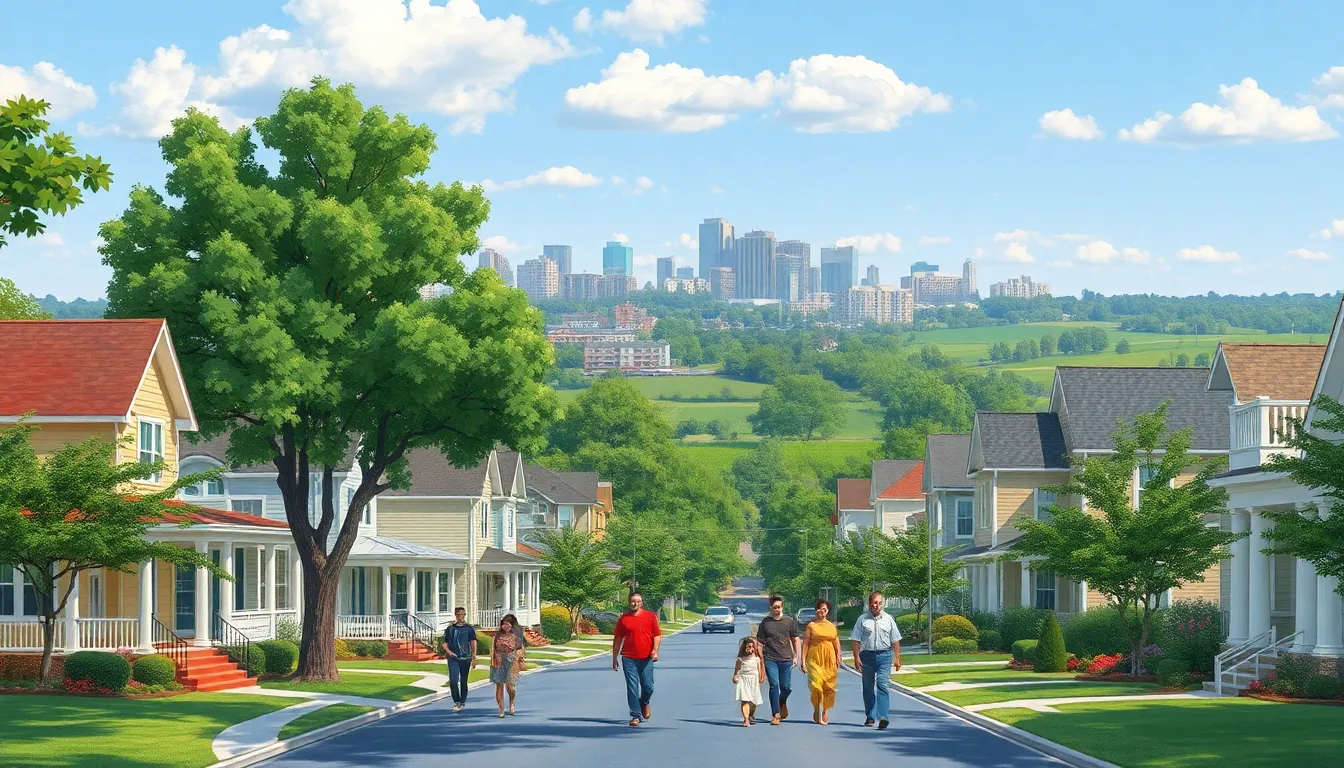Las Vegas, the city of neon lights and high-stakes gambling, isn’t just about the thrill of the roulette wheel. It’s also a hotbed for real estate opportunities that could leave even the most seasoned investors feeling lucky. As the housing market evolves, many are wondering what 2025 holds for this dazzling desert oasis. Will prices soar like a showgirl’s feathered headdress or crash harder than a bad blackjack hand?
With its booming population and a steady influx of newcomers, the Las Vegas housing market is a captivating puzzle. Understanding the trends and predictions for the next few years could mean the difference between hitting the jackpot or busting out. Buckle up as we dive into the crystal ball of real estate, revealing insights that could make anyone feel like they’ve struck gold in the heart of the Nevada desert.
Table of Contents
ToggleLas Vegas Housing Market Overview
Las Vegas boasts a diverse housing market that attracts a variety of buyers and investors. Significant population growth drives the demand for homes in the region. As new residents move to the area, they seek both rental properties and homes for purchase.
Current statistics reflect a competitive market, with a notable increase in home prices over the past few years. In 2023, the median home price reached approximately $400,000, representing a year-over-year increase of about 8%. This upward trend raises questions about future price movements.
Many experts anticipate continued price appreciation as the job market strengthens and economic growth becomes evident. Factors such as low unemployment rates, job creation in key sectors, and ongoing investments in infrastructure contribute to a robust real estate landscape.
Potential buyers should consider various types of properties. Single-family homes, condos, and townhouses each offer unique opportunities. Buyers interested in investment properties may find multi-family units particularly appealing given the rental demand in the region.
Market predictions suggest home prices may stabilize in 2025. With an expected annual growth rate of 3% to 5%, potential buyers could face fewer bidding wars. Nevertheless, fluctuations in interest rates and economic conditions will heavily influence these outcomes.
Observing market trends and demographic shifts remains essential for informed real estate decisions. Understanding these dynamics equips investors and buyers to navigate the Las Vegas housing market effectively.
Current Trends Influencing Predictions

Las Vegas’ housing market experiences various trends that influence predictions for 2025. Understanding the economic landscape and demographic changes plays a crucial role in forecasting home prices and demand.
Economic Factors
The Las Vegas economy remains robust, supporting real estate growth. Notably, employment levels have consistently shown improvement, contributing to the job market’s strength. With unemployment rates hovering around 3.2%, more individuals are able to invest in residential properties. Infrastructure investments, including road expansions and public transportation improvements, foster economic mobility and attract businesses. Housing affordability also influences buyer behavior, especially with median home prices at approximately $400,000. In light of these factors, experts anticipate a steady annual growth rate of 3% to 5% in home prices through 2025, assuming the economic conditions remain stable.
Demographic Changes
Las Vegas sees significant demographic shifts that impact its housing market. A growing population, fueled by an influx of new residents, creates heightened demand for housing. Young professionals and families are drawn to the area due to job opportunities and vibrant lifestyles. This influx alters housing needs, driving interest in various property types such as condos and townhouses. Additionally, the percentage of renters is on the rise as more individuals seek flexibility in their living situations. As demographic trends evolve, understanding these changes allows investors to make informed decisions and align their strategies with market demands.
Predictions for 2025
Industry experts anticipate a dynamic landscape for the Las Vegas housing market in 2025, shaped by various economic factors and demographic shifts.
Price Trends
Home prices in Las Vegas are expected to stabilize by 2025, with annual growth rates projected between 3% and 5%. This prediction follows a significant increase in median home prices, which reached around $400,000 in 2023. Strengthening economic conditions and a deeper job market contribute to this stabilization. Many buyers might notice a reduction in intense bidding wars, providing more opportunities to purchase homes without overwhelming competition. Low unemployment rates around 3.2% suggest that the population’s purchasing power will remain solid, supporting sustained investments in residential properties.
Supply and Demand Dynamics
Supply and demand dynamics play a crucial role in shaping Las Vegas’s housing market. Population growth continues to drive demand for various property types, including single-family homes and multi-family units. New infrastructure projects enhance accessibility, attracting families and young professionals. While the demand remains high, housing supply may gradually increase, helping to alleviate some pressure. These factors will collectively influence pricing strategies across the market. Investors benefiting from understanding these dynamics can make informed decisions tailored to current housing needs. Observing changes in construction trends and zoning regulations will be vital for navigating the market effectively in 2025.
Impact of Technology on Real Estate
Technology significantly influences the Las Vegas housing market. Innovations in real estate platforms, like online listings and virtual tours, enhance property visibility. Buyers access homes from anywhere, reducing the need for in-person visits.
Data analytics plays a crucial role in understanding market trends, helping investors make informed decisions. Algorithms analyze buyer behavior, ensuring tailored marketing strategies. These analytics inform pricing decisions, making fluctuations easier to predict.
Smart home technology attracts tech-savvy buyers. Energy-efficient appliances, security systems, and smart thermostats increase property appeal. Homes equipped with these features often command higher prices in competitive markets.
Blockchain technology streamlines transactions, minimizing fraud risks and increasing transparency. The use of blockchain allows for secure, swift trades, benefiting both buyers and sellers. Future reliance on this technology may reduce closing times and lower transaction costs.
Real estate agents leverage social media to reach broader audiences. Platforms like Instagram and Facebook showcase properties through engaging content. Targeted ads provide opportunities to connect with potential buyers more effectively.
Industry professionals utilize virtual reality to enhance property showings. Prospective buyers experience immersive tours, making it easier to envision living in the space. This technology shortens the decision-making process and increases buyer engagement.
Automation tools enable seamless communication between agents and clients. Chatbots and automated emails provide timely information, improving overall customer experience. Efficiency gains from these tools support agents in managing larger client bases effectively.
Overall, technology reshapes the Las Vegas housing market landscape, creating new opportunities. Investors and buyers must stay informed about technological advances to navigate the evolving market successfully. An understanding of these technological influences is crucial when evaluating future housing trends.
Possible Challenges Ahead
Economic fluctuations pose a significant challenge for the Las Vegas housing market. Interest rate variability directly impacts home financing costs, making mortgage affordability a concern for potential buyers. When interest rates rise, buyers may face increased financial strain, reducing the pool of eligible purchasers in the market.
Affordability emerges as another pressing issue. With the median home price reaching approximately $400,000, many first-time buyers struggle to enter the market. Strong rental demand further complicates the situation, as higher rental prices can lead potential buyers to delay home purchases, prolonging their search for affordable housing.
Competition in the market remains intense. With a growing population and an influx of new residents, bidding wars may escalate, particularly for desirable property types such as single-family homes and condos. This heightened competition can drive prices upward, creating barriers for buyers with limited budgets.
Changes in demographic trends could also influence the market. An increase in young professionals and families shifts housing needs, emphasizing the demand for diverse property types. If developers don’t adjust their offerings accordingly, mismatches in supply and demand may arise.
Infrastructure improvements provide both opportunities and challenges. While these projects aim to enhance economic mobility, construction delays or disruptions can lead to short-term inconveniences for residents. Ensuring that new developments align with the evolving demands of the population becomes crucial.
Sustaining the momentum of economic growth challenges the housing market as well. While current employment rates hover around 3.2%, any economic downturn could dampen buyer confidence and disrupt housing demand. Observing these economic and demographic factors closely helps in navigating potential pitfalls in the Las Vegas housing landscape.
The Las Vegas housing market is poised for an intriguing phase as it approaches 2025. With a vibrant economy and a growing population driving demand for various property types, potential investors have a unique opportunity to capitalize on emerging trends.
While home prices are expected to appreciate at a moderate rate, buyers should remain vigilant about market fluctuations and economic indicators. The interplay of technology and real estate continues to reshape how transactions occur, making it essential for investors to stay informed.
As the landscape evolves, understanding the nuances of this dynamic market will be key to navigating potential challenges and seizing opportunities. The future of Las Vegas real estate holds promise for those ready to adapt and engage with its ever-changing environment.






